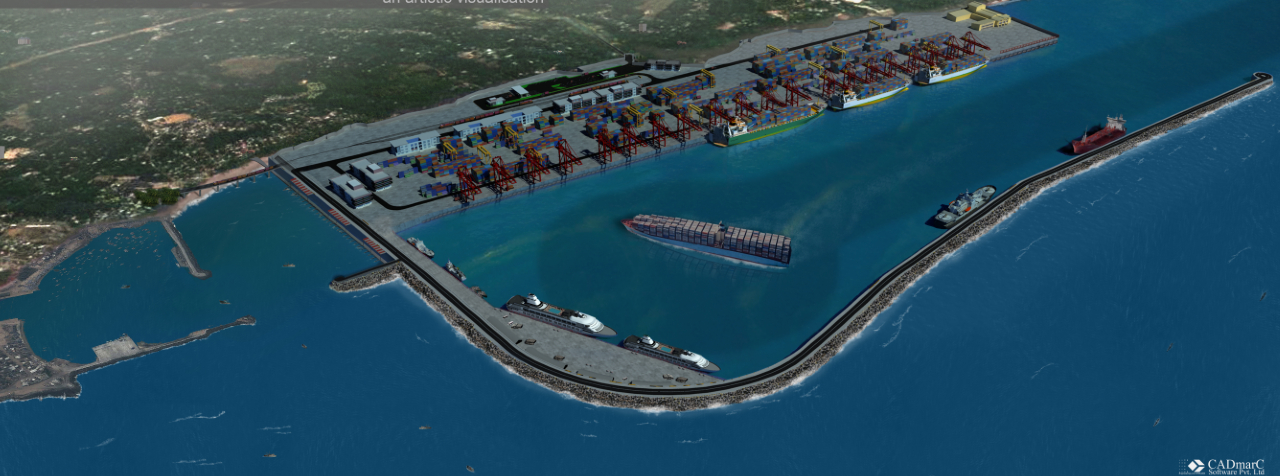
'Adani should go back': Fishermen intensify protest against Vizhinjam port

Ever since the construction of Vizhinjam International transhipment terminal began in 2015, the fishermen community has been raising concerns about coastal erosion, displacement and job loss. The construction of the port, which was expected to be completed within two years, is still going on.
The community, on strike since July 20, has undertaken a massive agitation organised under the leadership of the Latin Catholic Church at Thiruvananthapuram.
On the seventh day of the strike, hundreds of fishing boats from the southern districts gathered in the sea surrounding the port. A large number of fishermen broke the barricade right in front of the port and entered inside shouting slogans ‘Adani should go back’.
The ongoing strike was triggered off on July 20 with demonstration and dharna at the secretariat raising seven demands, including the implementation of a complete rehabilitation package and an independent and comprehensive study on the environmental and social impact of the project.
Also read: Protesting fisherfolk force their way into Vizhinjam port site; tension prevails
‘Just promises from government’
“We have been raising this demand since the inception of the project in 2015. Governments used to give us promises every time we protested and we waited for the promises to happen. Nothing has happened so far, hence we are into this indefinite strike,” says Patrick Michel, the convenor of the action committee who is also the president of Kerala Latin Catholic Association.
The Rs 7,525-crore deep-water, multi-purpose, international seaport and container transhipment terminal at Vizhinjam, owned by Adani group, is located 16 km south-west of Thiruvananthapuram town and 17 km south of Thiruvananthapuram International Airport (which is also run by the Adani group). Of the total area of 142 hectares, 53 hectares would be acquired by filling the sea with sand.
The ongoing construction of breakwaters has created massive changes in the direction of the sea waves, causing coastal erosion across the entire coast of the project area. The protesters allege that the construction of the breakwaters is quite unscientific and not substantiated by any proper study.
“Both the UDF and LDF governments promised us to conduct scientific examination of the environmental impact, but all the studies conducted so far were sponsored and had been done with vested interest. We demand to put the construction on hold and to go for an independent and scientific assessment of the situation,” says Patrick.
Apart from a proper study, the protesters are also demanding immediate implementation of a comprehensive displacement package. According to the action council, the government has so far given rehabilitation only to 152 families. “Thousands of families are badly affected. In Valiyathura (a fishing village at Vizhinjam), 350 families live in camps,” says Patrick.
‘Breakwaters causing accidents’
According to them, around 400 houses have been washed off by high waves which is a direct impact of the construction of breakwaters.
The action council has also asked for adequate compensation for those who have lost livelihood due to displacement as well as coastal erosion. The action council says it will not stop the protest unless the government gives instruction to stop the ongoing dredging activities for the construction of the port.
The construction of breakwaters has also caused accidents in the sea, say the activists supporting the fishermen on strike. “The basic construction for the structure of the Vizhinjam commercial port is the breakwater. Not even 10 per cent of the construction is yet finished. It is a bare fact that the ongoing dredging and construction of breakwater have been a threat to the Vizhinjam fishing harbour. Many boats have met with freak accidents and the sea has become rougher at the entrance of the harbour,” A J Vijayan, an expert on coastal issues and the former spokesperson of National Fish workers Forum told The Federal.
The demand put forward by the action council also includes compensation to the victims of sea accidents caused by the construction of the port. The seven-point agenda of the protest also includes compensation of minimum wages for fishermen on the days on which they are forced to stay back from work.
Warning by CAG report
The Comptroller and Auditor-General (CAG) in a report in 2017 had warned that the project was going to be a huge loss for the government. Towards the end of the concessional period (40 years), the government of Kerala would have incurred a loss of Rs 5,608 crore, it said.
Also read: Twin concerns over draft Indian Ports Bill aimed to replace British Raj law
CAG also reported that the conditions of the agreement were prepared in favour of the concessionaire (the Adani group) and not in favour of the interest of the state. Even the pre-qualification criteria for the tendering process were flawed, according to the CAG report of 2017. The standard concession period for PPP projects is 30 years and it is extended to 40 for Vizhinjam project. “By allowing 10 years‟ extra concession period, the Concessionaire would be collecting additional revenue of Rs 29,217 crore,” the report said.

